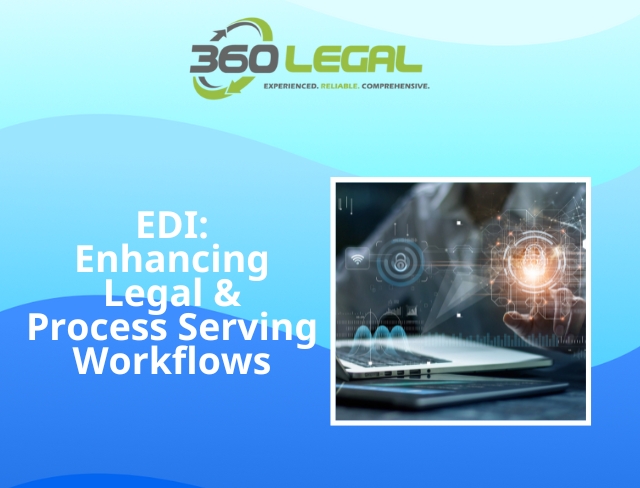Testing RSS Feeds.. ignore post.
Testing RSS Feeds.. ignore post.
EDI: Enhancing Legal & Process Serving Workflows

In the fast-paced legal industry, where time is of the essence and accuracy is paramount, the efficient exchange of data and documents can make or break a case. Manually handling legal workflows and document transfers not only introduces the risk of errors but also creates bottlenecks that hinder productivity and delay critical proceedings.
The following is a DRAMATIZATION AND IS NOT AN ACTUAL EVENT: Imagine a scenario where a law firm is dealing with a high-stakes case, involving numerous parties and a deluge of documents. Without a streamlined system for document exchange and data transfer, the firm struggles to keep track of versions, maintain audit trails, and ensure compliance with document retention requirements. This inefficiency not only increases the risk of errors but also compromises the firm’s ability to provide timely and effective legal services.
Enter EDI (Electronic Data Interchange) processing, a powerful solution designed to revolutionize legal workflows and facilitate seamless data exchange between legal entities. This article will explore the benefits of EDI processing and how partnering with an experienced provider can empower your legal organization to operate with unparalleled efficiency and compliance.
Understanding EDI Processing
EDI (Electronic Data Interchange) is a standardized format for exchanging data between businesses or organizations. In the legal industry, EDI processing plays a crucial role in facilitating the secure and accurate transfer of data between law firms, courts, and other legal entities.
By leveraging industry-specific standards and protocols, EDI processing streamlines legal workflows by automating data exchange, reducing manual data entry, and ensuring the integrity and security of sensitive information. This not only enhances accuracy but also minimizes the risk of human error, saving legal organizations time and resources.
By adopting EDI processing, legal firms and organizations can save time, reduce costs associated with manual data entry and error correction, and minimize the risk of costly mistakes that could compromise legal proceedings.
Streamlining Document Exchange
Legal proceedings are document-intensive, and the efficient exchange of these critical files is paramount. Manual document handling introduces numerous challenges, including version control issues, security risks, and delays that can impede the smooth progression of legal cases.
EDI processing offers a seamless solution for automated and secure document exchange between parties involved in legal proceedings. With real-time tracking and comprehensive audit trails, legal organizations can maintain complete visibility and control over their document flows, ensuring compliance with legal document retention requirements and enhancing overall accountability.
By streamlining document exchange through EDI processing, legal organizations can mitigate the risks associated with manual document handling, improve efficiency, and ensure the integrity and security of their critical legal documents.
Integration with Legal Software Systems
To fully leverage the power of EDI processing, seamless integration with existing legal software systems is essential. From case management platforms to document management systems, EDI processing solutions must seamlessly interoperate with these critical tools, enabling data synchronization and ensuring a cohesive and efficient legal workflow.
The following is a DRAMATIZATION AND IS NOT AN ACTUAL EVENT: Consider a law firm that has recently implemented a cutting-edge case management system but struggles to integrate it with their existing document exchange processes. This lack of integration not only creates data silos but also introduces inefficiencies and the risk of errors, hindering the firm’s ability to fully capitalize on the potential of their new software investment.
By partnering with a process serving company that offers EDI processing solutions tailored to the legal industry, legal organizations can achieve seamless integration, enabling increased productivity, enhanced data accuracy, and optimal utilization of their existing software investments.
Enhancing Process Service Efficiency through EDI Integration
In the fast-paced world of process serving, where time-sensitive legal documents must be delivered with utmost precision and accuracy, the integration of EDI (Electronic Data Interchange) processing can revolutionize operations and streamline workflows. By seamlessly exchanging data and documents between process serving companies, law firms, and court systems, EDI processing eliminates the inefficiencies and risks associated with manual data entry and document handling.
Through EDI integration, process servers can receive case assignments, service instructions, and related documents directly from their clients’ case management systems or legal document repositories. This automated data exchange not only reduces the potential for errors but also ensures that process servers have access to the most up-to-date and accurate information, enabling them to execute service efficiently and compliantly.
Furthermore, EDI processing allows for real-time tracking and status updates, providing law firms and legal entities with complete visibility into the progress of service attempts. This transparency enhances accountability and facilitates timely communication, ensuring that all parties involved are informed and can take appropriate actions as necessary.
Once service has been completed, process servers can seamlessly transmit proof of service documents, affidavits, and other critical files back to their clients’ systems through EDI channels. This eliminates the need for manual data entry, reduces the risk of errors, and ensures that legal records are accurately maintained and readily available for subsequent legal proceedings.
By integrating EDI processing into their operations, process serving companies can streamline their workflows, enhance efficiency, and provide superior service to their legal clients. This technological advancement not only improves productivity but also reinforces the integrity and compliance of the entire process service ecosystem, ensuring that legal proceedings are conducted with the utmost diligence and professionalism.
Frequently Asked Questions
1. What are the benefits of EDI processing for legal organizations?
EDI processing offers numerous benefits for legal organizations, including improved accuracy, reduced manual data entry, enhanced security, streamlined document exchange, real-time tracking, audit trails, and compliance with legal document retention requirements.
2. How does EDI processing integrate with existing legal software systems?
EDI processing solutions can seamlessly integrate with existing legal software systems, such as case management platforms and document management systems, enabling data synchronization and ensuring a cohesive and efficient legal workflow.
3. Why is it important to partner with an experienced EDI processing provider for the legal industry?
Partnering with an experienced EDI processing provider specialized in the legal industry ensures that your organization’s unique requirements and industry-specific standards are met, enabling secure, efficient, and compliant data exchange and document management.
Conclusion
In the ever-evolving legal landscape, where efficiency and accuracy are paramount, EDI processing emerges as a game-changer for streamlining legal workflows. By automating data exchange, facilitating secure document sharing, and seamlessly integrating with existing legal software systems, EDI processing empowers legal organizations to operate at their peak potential.
At 360 Legal, we understand the unique challenges and complexities of the legal industry. Our team of experts specializes in providing tailored EDI processing solutions that not only meet but exceed the highest standards of security, efficiency, and compliance.
Unlock the full potential of your legal workflows and position your organization for success. Contact us today at (888) 360-5345 to schedule a consultation and explore how our EDI processing solutions can revolutionize your legal operations, ensuring seamless data exchange, streamlined document management, and unparalleled efficiency in every aspect of your legal practice.
Author
We are Social!
Latest tweets
Popular Tags
Testimonials
"5 star service ! prompt serving, helpful, professional . "
"Mike is awesome. Our firm has hired him on several occasions and we are very happy with his work. His prompt serving, helpful, professional and always in communication. I recommend him highly! "
"360Legal provides speedy and easy to use Process Service that is flexible, and very transparent with nearly instant reporting. It is very helpful for us to be able to track the status of our process service jobs, especially when they are time sensitive. "
Latest News
-

RMAI 2021 Annual Conference RMAI Annual Conference
April 12-15, 2021 -

NATIONAL CREDITORS BAR ASSOCIATION 2020 SPRING CONFERENCE
May 19-21, 2021 -

ALFN ANSWERS 2021
Jul 18-21, 2021 -

Annual Convention and Expo
Oct. 17-21, 2021 -

Florida Association of Professional Process Servers 33rd Quarter Board Meeting/Professional Beach Getaway
Aug. 20-22, 2021












